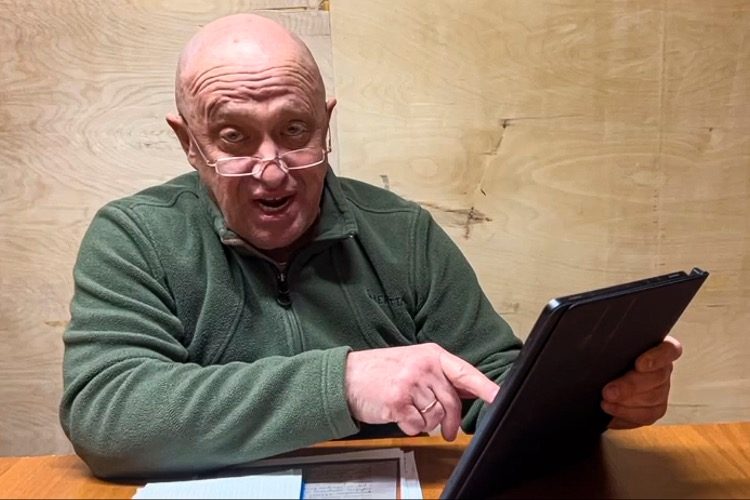
Russian authorities have authenticated reports that a private jet with Wagner Group founder Yevgeny Prigozhin mentioned as a passenger crashed between Moscow and St. Petersburg on Wednesday, August 23, killing all passengers on the plane.
Prighozhin, 62, was on the flight together with various high-ranking Wagner commanders, according to Rosaviatsiya, the Russian federal air transport agency. Dmitry Utkin, the co-founder of Wagner and a former Russian military intelligence special forces officer, was also on board, according to the passenger list of the ill-fated flight. Other passengers include Valery Chekalov (whom the United States regarded as the deputy head of Wagner), Sergey Propustin, Evgeny Makaryan, Alexander Totmin, and Nikolay Matuseev.
The Russian Emergencies Ministry verified that the jet plummeted to the ground in the Tver Region, and that all three crew and seven passengers on board did not survive. The jet, an Embraer 135BJ Legacy 600, was heading from Moscow to St. Petersburg at the time of the incident. Flightradar24 online tracker indicated that the Embraer Legacy 600 (plane number RA-02795) transporting Prigozhin had disappeared from the radar at 1811 local time. Based on the flight-tracking site FlightRadar24, a second plane associated with Prigozhin with the tail number RA-02878 left Moscow briefly after the first, but returned to land following news of the crash.
Notably, flight-tracking data gave no hint of a distress call or inflight emergency, and the aircraft was still ascending when it disappeared from the radar. That being said, media channels linked to Wagner claimed that a Russian air defense missile had downed the plane, without giving evidence.
Various short clips of the crash have been shared on social media, while videos posted by the Mash and Baza Telegram channels seem to depict the jet plunging toward the ground, accompanied by a line of black smoke. Moreover, the Interfax news agency, citing emergency services, reported that the bodies of all 10 people traveling on board the crashed plane have been retrieved from the scene, ending the search operation.
Amid news of the crash, Russian President Vladimir Putin was at a concert commemorating the 1943 Battle of Kursk and lauding the troops who have participated in the ongoing Russo-Ukrainian conflict.
Mikhail Podolyak, a chief advisor to Ukrainian President Volodymyr Zelensky, remarked that Prigozhin’s reported death proved that “it is obvious that Putin does not forgive anyone for his own bestial terror.” Prigozhin’s move to end the uprising against Russian military leadership he started in late June was a “death warrant,” he continued.
A Telegram channel related to Wagner said Prigozhin is dead, whereas the Grey Zone account reported that he was “killed as a result of actions by traitors of Russia.”
In an image published by another pro-Wagner social-media account depicting burning wreckage, a partial tail number matching the jet was visible. Prigozhin had supposedly used the plane before, including shortly after the failed armed uprising.
Formerly a low-profile businessman, Prigozhin benefited from Putin’s patronage, earning the sobriquet “Putin’s chef.” He became rich from state contracts and later went on to set up a paramilitary army that became a vital enlargement of Russian power abroad.
Moscow would frequently dismiss any official connection to the Wagner group, founded in 2014. Fighters for the private military company were mobilized to back Moscow’s allies in countries including Syria, Libya, and the Central African Republic. Prigozhin has denied U.S. allegations of Wagner atrocities. He rose to importance during the current Russo-Ukrainian conflict, where his fighters were at the front line of Russian military actions in the city of Bakhmut.
Prigozhin claimed in June that Russian forces shelled a Wagner field camp, where his troops had been resting and rearming following the capture of Artyomovsk (Bakhmut) the previous month. The Wagner founder then announced that he would lead his forces in a march on Moscow. Wagner fighters took control of the southern city of Rostov-on-Don. They then headed toward Moscow to remove supposedly corrupt military officials, shooting down several Russian military helicopters, killing the pilots.
In a television address as Prigozhin’s forces marched toward Moscow, Putin slammed Prigozhin’s move as an act of treachery that would meet with adverse consequences. Putin portrayed the mutiny as a “stab in the back” and vowed “decisive actions.” Nonetheless, Belarusian President Alexander Lukashenko helped mediate between the two sides to defuse tensions. Prigozhin agreed that the men who participated in the mutiny would be redeployed to Belarus, while others would join units under the control of the Russian Defense Ministry. As part of that Belarusian-brokered agreement, Prigozhin and some of his fighters would depart for Belarus, while Russia would drop a criminal case against him for armed mutiny.
Nevertheless, on July 5, Russian state television said that authorities were still investigating Prigozhin, showing broadcast footage depicting seized cash, passports, weapons, and other items from one of his properties.
While Prigozhin’s allies expressed dismay and shock at the tragic crash footage on August 23, some in the Russian establishment had said that Putin would not forgive Prigozhin for his betrayal. After all, the former Wagner chief’s uprising signified the most crucial threat to Putin’s authority since becoming leader of Russia.
Prigozhin’s plane crash also came in light of news that Moscow had dismissed General Sergey Surovikin of his post at the Russian aerospace forces, marking the highest-level sacking yet of a military commander following Prigozhin’s mutiny.
Prigozhin’s public backing of Surovikin, a veteran commander who was perceived as an ally of the Wagner militia in the Russian defense ministry, had given rise to rumors over whether he or other senior commanders had any role in the mutiny or at least had information about Prigozhin’s plans. In wake of the crash, Britain’s Foreign Office said it was “monitoring” events closely, while U.S. President Joe Biden said he was not surprised by the news, elaborating that “not much happens” in Russia that Putin is not responsible for.


